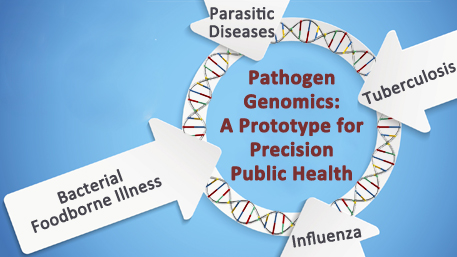Category: genomics
Progress in Pathogen Genomics as a Prototype for Precision Public Health

Rapid advances in pathogen genomics have ushered in a new era of “precision public health.” Next-generation sequencing is already enabling more effective investigations of outbreaks of foodborne illnesses, better-targeted tuberculosis control, and more timely and granular influenza surveillance to inform the selection of vaccine strains. In a recent paper in the New England Journal of Read More >
Posted on byCommunication and Information Sharing about Genomics and Precision Health: Opportunities for Improvement

In this blog, we describe our current approach to information sharing based on a recent review of our communication and engagement strategies. In order to improve our approaches to communication, we are asking you, our readers, for feedback—please share your thoughts in the comments section below or send us an email at mailto:genetics@cdc.gov. For the Read More >
Posted on byGenomic Medicine Year in Review 2019: What’s Hot for Public Health Impact?

Advances in genomic medicine continue at a fast and steady pace. In a recent paper, The Genomic Medicine Working Group of the National Advisory Council for Human Genome Research of the National Human Genome Research Institute identified the most significant advances in genomic medicine among 48 recognized “accomplishments” published during the 12 months ending August 31, Read More >
Posted on byAre we Ready for DNA-based Population Screening? The Need for Large Collaborative Pilot Studies

This blog is a summary of a recent viewpoint published in the Journal of American Medical Association. There is increasing evidence that accepted approaches using medical history-based screening fail to identify the majority of individuals with genetic conditions associated with cancer and heart disease, including CDC tier 1 applications, such as hereditary breast and ovarian Read More >
Posted on byHappy Thanksgiving 2019: Collect and Share Your Family Health History: It Could Save Your Life!

Happy Thanksgiving Day! It is time for our yearly message on the importance of family health history to your own health. Year after year we promote the value on family health history around Thanksgiving day and all year round. By knowing and acting on your family history, you can reduce your disease risk and actually Read More >
Posted on byFamilial Hypercholesterolemia as a Prototype for Precision Public Health

In October 2019, the 7th annual FH Foundation global summit on familial hypercholesterolemia (FH) took place in Atlanta, Georgia. The theme of the conference was, “Familial Hypercholesterolemia as a Prototype for Precision Public Health.” The meeting brought more than 300 participants from multiple countries to discuss the latest advances in the diagnosis, screening, treatment and Read More >
Posted on byPublic Health Perspectives on Ensuring Life Long Benefits of Newborn Screening

This blog post is a summary of a Perspective recently published in Pediatrics that was authored by Alex Kemper of Nationwide Children’s Hospital, Jeffrey Brosco of the Miller School of Medicine, University of Miami, and Coleen Boyle and Scott Grosse of CDC’s National Center on Birth Defects and Developmental Disabilities. Newborn screening is a highly Read More >
Posted on byMany Adults with Familial Hypercholesterolemia Are Not Meeting Goal LDL-Cholesterol Level

People with the genetic disorder familial hypercholesterolemia (FH) have increased blood levels of low-density lipoprotein (LDL) cholesterol, which increases their risk for developing coronary artery disease or having a heart attack. A recent study using data from the FH Foundation’s CASCADE FH Registry suggests that many individuals with FH are not meeting blood LDL-cholesterol level Read More >
Posted on byWhat’s the “value” of exome sequencing in children with neurodevelopmental disorders?

This is a summary of a recent commentary in Genetics in Medicine by Grosse and Rasmussen. Exome sequencing (ES) is increasingly used as part of the genetics evaluation of neurodevelopmental disorders, and acute illness in newborns of suspected genetic origin, among others. However, barriers to the clinical use of ES include a widespread reluctance of insurers Read More >
Posted on byCan a Healthy Lifestyle Reduce Your Risk of Dementia Regardless of Your Genes? – Part II

A new, long term cohort study suggests that healthy lifestyle is associated with a lower risk for dementia among people considered at lower and intermediate genetic risk but not for those considered at high genetic risk. “Globally, about 47 million people were living with dementia in 2015, and this number is projected to triple by Read More >
Posted on by